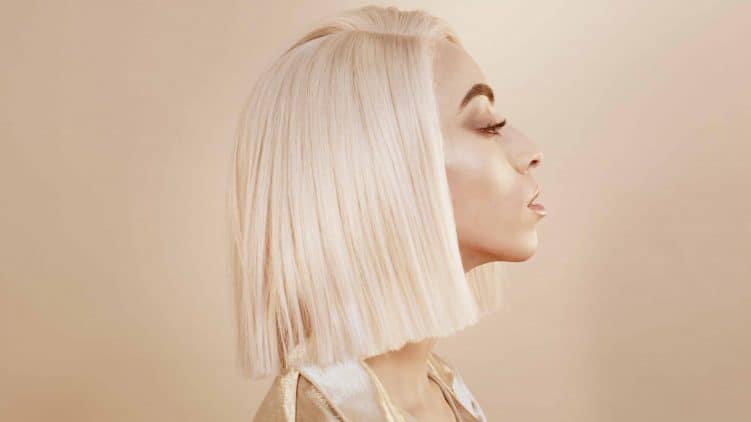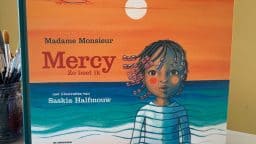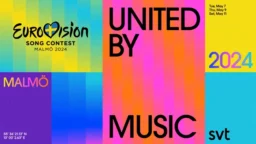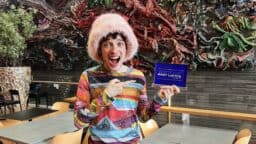He is nineteen years old (born on the day of the nines: 9-9-’99) and he is the French participant at Eurovision 2019. Bilal Hassani is his name, a boy of Moroccan-French descent, who got famous after taking part in The Voice Kids (where he sang Conchita Wurst’s winning Eurovision song Rise like a Phoenix) and is especially loved because of his YouTube-channel (where he opens his vids by calling out his catchphrase: ‘Bonsoir Pariiiiiiiiiiis!’).
But with the fame came the fights. Hassani has been attacked for being queer, for being muslim, for being flamboyant, for wearing wigs, and for so many other things. But, as he states in his Eurovision song: ‘I am me. ‘ And also: ‘I can see my kingdom now – ’cause in my dreams I am a king.’
On that account it’s not surprising that he named his first album Kingdom. He leads us through Bilal country in fifteen songs, and hereby we highlight the most beautiful lyrical lines he expresses along the way.
‘The music starts in these shadows, baby.’
The first track (a bit over one minute long) is like the lobby. Curtains are being pulled up, Bilal sings, and the lights are being dimmed. And then: ‘Welcome to my kingdom! Welcome to my kingdom! Welcome to my kingdom!’
‘I know I’m not in control, I wish I was in control’
But immediately in the first full song, Panic, it’s made clear that this will not just be a country of pink-dressed lackeys. Hassani, who collaborated on all the lyrics and wrote this one by himself, tells us how a panic attack feels: ‘I close my eyes, j’essaie de respirer’ (‘I close my eyes, I try to breath’- the whole album is a mixture of sentences in English and in French). And the chorus says: [I’m] ‘stuck in my body’. What is it that causes this panic? ‘I hear those voices in my head, they tell me I’m crazy.’ A prompt reference to all the dark opinions that were hurled at him.
‘Je suis free.’
It makes sense that right after this one we get Hassani’s first single, which is his Eurovision entry Roi. In which Bilal, as mentioned before, says: ‘I am me, and I know I will always be. Je suis free.’ So it looks like he found himself an escape route – or that he at least tries to claim one. ‘At the end of the day you cannot change me, boo. So laisse moi m’envoler’ (‘So let me take off.’) But the nuance in the main line of the chorus shows that not all gloominess has disappeared: ‘Dans mes rêves je suis un roi.’ (‘I’m a king in my dreams.’) In his dreams.
‘Tu seras mon amour et mes chaînes’ (‘You will be my love and my chains.’)
But first we’ll go dancing! To the brisk Poison for instance, that talks about the toxic addiction that being in love can be – succinctly summed up in the lines: ‘Si ça me fait du mal, ça me fait du bien’, ‘If it makes me feel bad, it makes me feel good.’
Or in the second single Jaloux (Jealous), in which Hassani quotes all kinds of insults that were poured out upon him after winning the French Eurovision preselection. ‘J’aimerais te voir mourir, tu mérites pas de bien.’ (‘I would like to see you die, you don’t deserve anything good.’) Pretty violent – but also here the worries are danced off. In a Stromae-like chorus Bilal repeats to himself: ‘They are jealous, jealous, jealous.’
‘Maintenant je parle, boy, à ton cœur.’ (‘Now, boy, I’m talking to your heart.’)
After a song in which Hassani summons others to believe in themselves, even though people are being mean to them (Qui cala?), we get yet another delightful club single (Fais beleck). This one is about a boy that Bilal dated for a while, but the boy couldn’t handle Hassani’s feminin side, and insited the affair to be a secret. Hassani now tells him: ‘Fais beleck, attention à ce que tu dis, tu vas avoir des ennuis.’ (‘Attention: be careful with what you say, it might cause you trouble.’)
‘La mer a ses humeurs et ses moments, elle change de couleur selon le vent’ (‘The sea has its moods and its moments, the wind makes it change its colours.’)
In the heart of Bilals kingdom (or let’s say, his album) we get to rest a bit alongside a sweet little fountain. At that place he tells us in a contemplative track how important it is to move along with the flow.
‘Le make-up et la wig sont on.’ (‘The make-up and the wig are on.’)
The midtempo-song Boom X3 is the zenith of Bilals tasty mixture of English and French. This one’s about clubbing, about getting ready with your friends (their names are mentioned in the song), and then: going out and late night dancing. Brands are mentioned, and even the title of the documentary Paris is burning (about America’s gay- and drag culture at the end of the eighties). After that Boom X3 closes with the delightful line: ‘On est ready to go.’
‘All we want is fantasy, et des kilos de bijoux.’ (‘All we want is fantasy and kilo’s of jewellery.’)
And Basic puts us in the club. Here Bilal finds himself to be hundred percent Bilal, which is noticeable at the infectious beat and the infectious mosaic of calls and sentences (‘Tu veux tuner ta face, ou tu la préfères natural? Montrer tes fesses ou les laisser qu’à ton top boy?’ ‘Do you wanna tweak you face, or do you like it natural? Wanna show your bottom, or is it booked for your top boy only?’). A steamy hit in the best RuPaul-tradition.
‘J’ai pas le time’ (‘I don’t have the time.’)
The next track (O.N.C., which stands for ‘Oui Non Comment’ – ‘Yes No How’), talks about those friendships that take up way too much energy. Bilal states he has dedicated so many talking nights to the given friend, but they proved to be meaningless. Thus: ‘I need an intervention’. The song itself is that intervention, with ‘Free yourself’ as the main message.
‘Eyes on me oh eyes on me’
After Dans mon seum, which is about the regrets you can have after breaking up with someone, we get a reflection on something that came to be a big part of Hassani’s kingdom: fame. In Famous he numerates the consequences and tries to demask them – because: how does it play out at night, when there are no likes left to count? ‘Quand je ferme les yeux, j’éteins les light. Tout est fini, il n’y a plus un bruit. Et si je disparaissais qui le verrais?’ (‘As I close my eyes and dim the lights, when all is done and everything goes quiet – who would notice me disappearing?’
‘I’ll never let you shake my heart from the left to the right again.’
The album concludes with two songs about relationships that are over. The tracks are related. Over you is about a guy (a ‘player’) that the narrator liked far too much, but who gave him nothing in return. ‘Baby I was at a hundred and you were at two.’
In You should have let me love you almost the same is happening, but here it seems the narrator came out stronger. This is not only asserted by the melody, but also by these clear sentences: ‘J’entends plus tes appelles, je lis même plus tes messages.’ (‘I don’t hear your calls any longer, I don’t even read your messages anymore.’)
And with that we leave Bibal’s Kingdom. We danced, we reflected on things, we understood how he shields himself and we know a bit more about his lovelife. Bilal Hassani has built himself a firm residence. Only weeks before Eurovision, he lets us know that he has already enlarged his domain – with the help of his producer Medeline, and songwriters LiliPoe and Madame Monsieur (the duo that took part in Eurovision for France in 2018) – and that we solidly can count on more expansion in the future.
Tracklist:
Welcome to my kingdom (Bilal/Medeline)
Panic (Bilal/Medeline)
Roi ((Bilal/Madame Monsieur/Medeline)
Poison (Bilal/Medeline/Emilie Satt)
Jaloux (Bilal/LiliPoe/Medeline)
Qui cala? (Bilal/Medeline/Traxx)
Fais beleck (Bilal/Medeline)
The flow (Bilal/Madame Monsieur/Medeline)
Boom 3X (Bilal/Madame Monsieur/Medeline)
Basic (Bilal/Emilie Satt/Medeline)
O.N.C. (Bilal/LiliPoe/Medeline/Traxx)
Dans mon seum (Bilal/Medeline/Traxx/Benjamin Herbez/Sullivan Gwed/Emilie Satt)
Famous (Bilal/LiliPoe/Medeline)
Over you (Bilal/LiliPoe/Adrien Fromager/Medeline)
You should have let me love you (Bilal/Madame Monsieur/Medeline)






